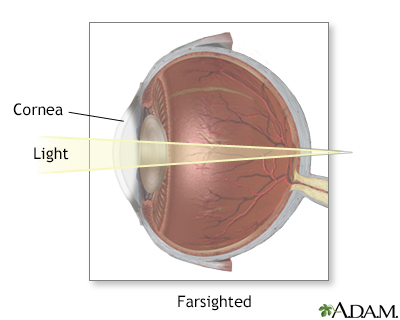Farsightedness
Hyperopia
Farsightedness is having a harder time seeing objects that are close than things that are far away.
The term is often used to describe the need for reading glasses as you get older. However, the correct term for that condition is presbyopia. Although related, presbyopia and hyperopia (farsightedness) are different conditions. People with hyperopia will also develop presbyopia with age.
Images




Presentation

Animation

Causes
Farsightedness is the result of the visual image being focused behind the retina rather than directly on it. It may be caused by the eyeball being too small or the focusing power being too weak. It can also be a combination of both.
Farsightedness is often present from birth. However, children have a very flexible eye lens, which helps make up for the problem. As aging occurs, glasses or contact lenses may be needed to correct the vision. If you have family members who are farsighted, you are also more likely to become farsighted.
Symptoms
Symptoms include:
- Aching eyes
- Blurred vision when looking at close objects
- Crossed eyes (strabismus) in some children
- Eye strain
- Headache while reading
Mild farsightedness may not cause any problems. However, you may need reading glasses sooner than people who do not have this condition.
Exams and Tests
A general eye exam to diagnose farsightedness may include the following tests:
- Eye movement testing
- Glaucoma testing
- Refraction test
- Retinal examination
- Slit-lamp examination
- Visual acuity
- Cycloplegic refraction, a refraction test done with the eyes dilated
This list is not all-inclusive.
Treatment
Farsightedness is easily corrected with glasses or contact lenses. Surgery is available for correcting farsightedness in adults. This is an option for those who do not wish to wear glasses or contacts.
Outlook (Prognosis)
The outcome is expected to be good.
Possible Complications
Farsightedness can be a risk factor for glaucoma and crossed eyes.
When to Contact a Medical Professional
Contact your health care provider or eye doctor if you have symptoms of farsightedness and you have not had a recent eye exam.
Also, contact your provider if vision begins to get worse after you have been diagnosed with farsightedness.
See a provider right away if you think you have farsightedness and you suddenly develop the following symptoms:
- Severe eye pain
- Eye redness
- Decreased vision
Related Information
RetinaGlaucoma
References
Cioffi GA, Liebmann JM. Diseases of the visual system. In: Goldman L, Cooney KA, eds. Goldman-Cecil Medicine. 27th ed. Philadelphia, PA: Elsevier; 2024:chap 391.
Diniz D, Irochima F, Schor P. Optics of the human eye. In: Yanoff M, Duker JS, eds. Ophthalmology. 6th ed. Philadelphia, PA: Elsevier; 2023:chap 2.2.
Holmes JM, Kulp MT, Dean TW, et al. A randomized clinical trial of immediate versus delayed glasses for moderate hyperopia in children 3 to 5 years of age. Am J Ophthalmol. 2019;208:145-159. PMID: 31255587 pubmed.ncbi.nlm.nih.gov/31255587/.
BACK TO TOPReview Date: 7/23/2024
Reviewed By: Linda J. Vorvick, MD, Clinical Professor, Department of Family Medicine, UW Medicine, School of Medicine, University of Washington, Seattle, WA. Also reviewed by David C. Dugdale, MD, Medical Director, Brenda Conaway, Editorial Director, and the A.D.A.M. Editorial team.

Health Content Provider
06/01/2025
|
A.D.A.M., Inc. is accredited by URAC, for Health Content Provider (www.urac.org). URAC's accreditation program is an independent audit to verify that A.D.A.M. follows rigorous standards of quality and accountability. A.D.A.M. is among the first to achieve this important distinction for online health information and services. Learn more about A.D.A.M.'s editorial policy, editorial process and privacy policy. A.D.A.M. is also a founding member of Hi-Ethics. This site complied with the HONcode standard for trustworthy health information from 1995 to 2022, after which HON (Health On the Net, a not-for-profit organization that promoted transparent and reliable health information online) was discontinued. |
The information provided herein should not be used during any medical emergency or for the diagnosis or treatment of any medical condition. A licensed medical professional should be consulted for diagnosis and treatment of any and all medical conditions. Links to other sites are provided for information only -- they do not constitute endorsements of those other sites. © 1997- 2025 A.D.A.M., a business unit of Ebix, Inc. Any duplication or distribution of the information contained herein is strictly prohibited.
